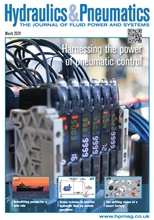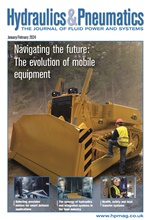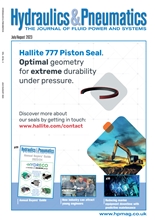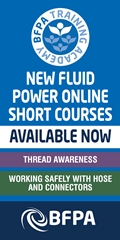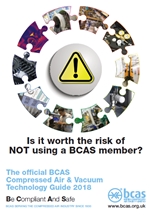BFPA defines minimum educational requirements in fluid power
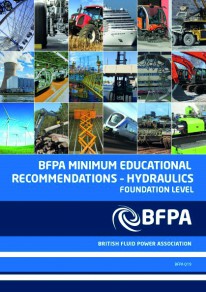
By leveraging the resources of its Education and Training (E&T) Committee, the British Fluid Power Association (BFPA) has developed a publication entitled ‘BFPA Minimum Educational Recommendations – Hydraulics’ as part of a three-part suite of Educational Recommendations which also cover Pneumatics and Electronic Control of Fluid Power. This new document presents the consolidated view of leading representatives and experts in fluid power – including academia, representatives from other BFPA member organisations, OEMs and the wider UK engineering industry – managed by a specially convened BFPA E&T Taskforce.
Ian McKenna, plant technical support supervisor at Bachy Soletanche in Lancashire, explained the need for adequate training: “We deal with big hydraulic drilling rigs – often with pressures up to 350 bar – and because people don’t see what is going on inside, they often don’t appreciate the dangers. This is especially true of new, young engineers who already have a digitally-based background, but very little appreciation of heavy ‘analogue’ equipment.”
A big step forward
He continued: “A prescribed minimum level training is a big step forward, as it will show from an early stage that you are working with equipment and media that could kill you. Technicians, operators, designers and maintenance engineers all need to understand how severe it could be – even by simply undoing a fitting. They all need minimum level of training in fluid power from the word go.
“We find that new staff who have been to college as part of an apprenticeship have not gone into enough depth in hydraulics and, since the downturn in manufacturing a few years back, there are no longer the staff to perform shadowing and traditional on-the-job training. As a result, we have created our own internal training course, which covers 90% of the BFPA’s minimum recommendations, and is in the process of being tailored to match them 100%.”
Graham Spencer, senior instructor at Festo, agrees with McKenna on the recent plight of UK engineering and the necessity for a consensus-based training regimen: “The emphasis on engineering in the UK has diminished recently. A huge blip some years ago, resulted in the throughput of people who would pick this up in their everyday job simply stopping. Luckily, this ‘error of ways’ has now been recognised, but we have still experienced a huge loss of skills. There just aren’t the people coming through that know this stuff. People haven’t been learning from others and there are fewer apprentices.”
He continued: “Luckily, this blip has galvanised industry, and the primary parties are all feeding their thoughts and concerns back into BFPA, the result being publications such as the ‘BFPA Minimum Educational Recommendations – Hydraulics.”
Training programmes to help everyone
Martin Kingsbury, membership and training director at the BFPA, explained the rationale behind the development of the document and the way forwards: “With fluid power technology being deployed in such a wide variety of industries, it is essential that we have some form of minimum requirement that addresses the needs of a contemporary workforce. We have now set up training programmes to help everyone – from the operator or technician on the shop floor up to the engineers – attain these levels.
“We are by no means the sole provider. Indeed, we are encouraging our members to create their own training programmes, taking guidance from the published levels and our written course material. Similar to the CORGI (gas safe) rating used in the gas industry, we want member companies and wider industry to adopt the ethos ‘if you are to work on my equipment, you need to have this prescribed minimum level of training’. This has to be industry driven…and by a willing industry, but it should have enough traction and buy-in that it will soon become the norm.”
But how do people prove their training levels? Kingsbury explained: “We have now introduced the BFPA training passport card, which includes a photograph and lists the cardholder’s verified training course details on the back. The idea is to highlight the individual’s commitment to safe working practices and high standards in the fluid power industry. The new training passport cards can be issued retrospectively to anyone who has completed a BFPA course within the past two years, or a CETOP course, and BFPA will hold the training history of those individuals who have completed courses directly with the BFPA or one of BFPA’s training providers.”
To download a free copy of the new guidelines visit the publications pages of the BFPA website: www.bfpa.co.uk
-
Smart Manufacturing & Engineering Week
05 - 06 June, 2024
NEC, Birmingham -
HILLHEAD 2024
25 June, 2024, 9:00 - 27 June, 2024, 16:00
Hillhead Quarry, Buxton, Derbyshire UK



